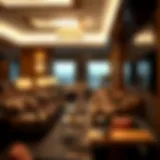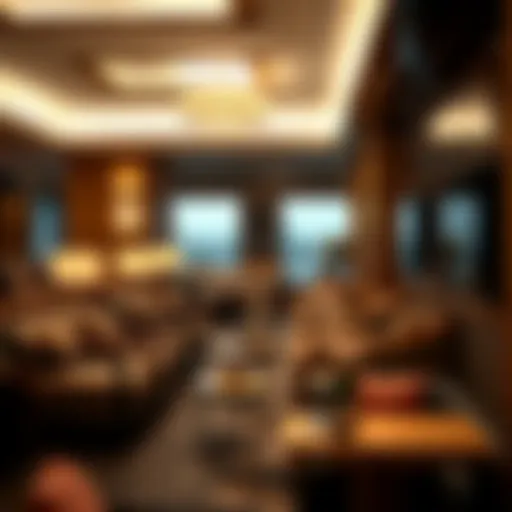Comprehensive Guide to Schools in Al Barsha


Intro
Al Barsha, a burgeoning suburb in Dubai, represents a melting pot of cultures and lifestyles, each shaped significantly by the educational institutions within its reach. Families are increasingly drawn to this area, not just for its modern amenities and vibrant atmosphere, but also for the high calibre of schools available. Education is not merely a structured process but a cornerstone that influences the development of children, molding their futures in ways we often overlook. As such, selecting the right school can be a daunting task, especially in a community rich with diverse educational opportunities that cater to both expatriates and locals alike.
In this article, we delve into the various schools in Al Barsha, examining their unique attributes, curricula, amenities, and enrollment processes. Each school's offering is distinct, tailored to meet the diverse needs of its student body. This exploration aids parents in navigating the educational landscape, shedding light on aspects that might otherwise remain in the shadows. As demand for quality education continues to rise, understanding the current trends in the local education market will empower parents to make informed choices for their children’s future.
Navigating this educational terrain is not just about picking a school; it’s about understanding how these institutions align with one's family values, expectations, and future aspirations.
By shedding light on the intricate dynamics of schools in Al Barsha, we aim to present a holistic view that fosters informed decision-making. In doing so, we hope to enhance the educational experience for future generations in this vibrant community.
An Overview of Al Barsha
Al Barsha, a vibrant district in Dubai, holds significance for educators, parents, and students alike. Understanding the importance of this neighborhood extends beyond just its geographical boundaries; it dives into the heart of a thriving community that is rapidly evolving. Here, families from varying backgrounds converge, creating a melting pot that enriches the educational framework available to children. This overview aims to provide a nuanced perspective of Al Barsha, ensuring that parents and stakeholders grasp its unique offerings and challenges.
Prolusion to Al Barsha
Nestled between major thoroughfares, Al Barsha is known for its accessibility and facilities. Originally developed in the early 2000s, it has transformed into a sought-after area for both locals and expatriates, particularly families. Its proximity to key landmarks such as the Mall of the Emirates and the Al Barsha Pond Park makes it appealing for community-oriented living. Schools in this district reflect the cosmopolitan nature of the area, catering to various cultural and educational needs.
Residents often describe Al Barsha as a place where everyone can find their niche. From modern high-rises to quiet streets lined with villas, the housing options attract a diverse population. This diversity manifests in the myriad of schools that dot the landscape, allowing families to choose educational institutions that align with their cultural values and aspirations for their children. The sense of community here is palpable, making it an attractive choice for those looking to build a life in the United Arab Emirates.
Demographics and Community
The demographic profile of Al Barsha underscores its status as a cosmopolitan hub. With a mix of Emiratis and expatriates from all corners of the globe, the community provides a rich tapestry of cultural experiences. This diversity not only contributes to a lively social scene but also plays a crucial role in the educational landscape.
- Cultural Influence: Schools in Al Barsha often adopt a global perspective in their curriculum, exposing students to various cultural norms and values.
- Community Engagement: Many educational institutions encourage parental involvement and community partnerships, enhancing the overall learning experience.
- Economic Factors: The economic landscape of Al Barsha is equally varied, with a blend of professionals from different sectors. Moreover, the growth of local businesses contributes to an environment that fosters educational advancements.
Understanding the demographics of Al Barsha is essential for investors, real estate agents, and parents as it informs choices related to housing and schooling. The area's integration of modern life with traditional values reflects a broader trend in Dubai, making Al Barsha a microcosm of the city itself.
"In Al Barsha, the blend of tradition and modernity creates a unique environment conducive to innovative learning and community engagement."
This overview serves as a foundation for exploring the educational landscape further, diving into the specific schools, curricula, and the essential processes involved for families looking to provide a quality education for their children in this dynamic area.
Educational Landscape
Understanding the educational landscape in Al Barsha is crucial for every parent navigating the intricate world of schooling options. This area is booming with diverse choices that cater to a myriad of educational philosophies, reflecting the rich tapestry of cultures that thrive within Dubai. In essence, a robust educational landscape signifies not just the availability of schools but also the variety of curricula, extracurricular activities, and the quality of facilities that define the learning experience for children.
For families, especially expatriates, the choice of school can significantly influence their adjustment in a new environment. Schools here often act as community hubs, providing not only education but also social networks for families who may feel isolated in a foreign land. The blend of local and international students creates an enriching experience that helps children gain a global perspective while rooted in community values.
Parents seeking the right school must consider the unique offerings each institution presents, exploring everything from teaching staff qualifications to campus facilities and extracurricular opportunities. Investing time in understanding the educational landscape ensures that families make choices that align with their educational aspirations and cultural expectations.
Diversity of Schools
Al Barsha is home to an impressive range of schools, accommodating a variety of learning preferences and student backgrounds. The spectrum includes private institutions, international schools, and those following the UAE national curriculum. Each school embodies specific pedagogical approaches, making it vital for parents to evaluate what aligns best with their child’s learning style.
- Private Schools: These are plentiful, often providing smaller class sizes and personalized attention. They usually follow curricula from various countries, catering to diverse expat populations.
- International Schools: Institutions like Dubai American Academy and British International School offer globally recognized programs, preparing students for seamless transitions across countries.
- National Curriculum Schools: Al Barsha also features schools that follow the UAE's educational guidelines. These schools can be pivotal for families eager to immerse themselves in the local culture while ensuring their children receive a quality education.
The diversity not only enriches the academic environment but also promotes cultural exchange among students, ultimately aiding holistic development.
Curriculum Options
Another key aspect of the educational landscape is the curriculum options available in Al Barsha, which are as varied as the schools themselves. Parents can select from several academic frameworks, each designed to offer a unique educational experience:
- British Curriculum: This approach is characterized by its depth and breadth, focusing on critical thinking and academic rigor. It leads to IGCSE and A-level qualifications, which are recognized globally.
- American Curriculum: With a flexible structure, this curriculum often emphasizes a student-centered approach and offers Advanced Placement (AP) courses, catering to those who desire a comprehensive education that prepares them for college.
- IB Programmes: The International Baccalaureate programs are renowned for their focus on inquiry-based learning, international-mindedness, and challenging assessments. Schools offering IB have a strong reputation for fostering global citizenship among students.
These curriculum choices provide a framework that not only aligns with educational standards but also enhances critical, creative thinking skills among students. As such, they prepare students not just academically, but also socially and emotionally, equipping them for future challenges both locally and globally.
"The quality of education a child receives can be a vital component of their long-term development and success."


Navigating through the educational landscape of Al Barsha empowers families to make informed choices, ensuring their children receive the best possible foundation for their future.
Private Schools in Al Barsha
The significance of private schools in Al Barsha cannot be overstated, especially within the context of the vibrant educational landscape of Dubai. These institutions cater to a diverse population, offering tailored educational experiences that meet the unique demands of both expatriates and local residents. The focus on individual learning needs and varied curricular options allows families to find the perfect fit for their children.
Private schools tend to provide smaller class sizes, fostering a more personalized educational environment. This personalized approach is often coupled with advanced resources and state-of-the-art facilities, making them highly sought after by parents who understand the critical role education plays in their children's future.
Notable Institutions
Al Barsha is home to several noteworthy private schools that stand out for their academic excellence and holistic approach to education. Notable mentions include:
- GEMS World Academy: Renowned for its International Baccalaureate programs, GEMS focuses on developing critical thinking and intercultural understanding, providing students with a global perspective.
- British International School: This institution prides itself on a well-rounded curriculum that combines the British educational framework with a range of extracurricular activities, promoting both academic and personal growth.
- American School of Dubai: Offering an American-style education with numerous Advanced Placement courses, this school prepares students for higher education and equips them with essential skills for the workforce.
Each of these institutions adds to the rich tapestry of educational choices available, ensuring parents have ample options based on their personal values and educational goals.
International Schools
International schools in Al Barsha are particularly appealing to expatriate families who seek familiar educational frameworks while residing abroad. These schools often offer internationally recognized curricula, such as the American, British, or International Baccalaureate systems, ensuring that students receive a quality education that can facilitate their transition back to their home countries.
Parents often appreciate the cultural diversity present in international schools. This environment not only broadens students' understanding of global citizenship but also helps them form friendships with peers from various backgrounds. Schools like Dubai American Academy or Nord Anglia International School exemplify this commitment to diversity while maintaining high academic standards.
In summary, private schools in Al Barsha offer a rich array of educational opportunities for families. By examining notable institutions and international schools, parents can navigate this landscape more effectively, ensuring the best possible educational experience for their children.
Curricula Offered
In the evolving educational landscape of Al Barsha, the significance of the curricula offered cannot be understated. The choice of curriculum often forms the bedrock of a student's academic experience, influencing their educational environment and career opportunities. As expatriate families look to settle in Al Barsha, understanding the various curricula available is essential for making informed decisions regarding their children's future. Different curricula cater to distinct educational philosophies and cultural backgrounds, offering diverse pathways to higher education and career success.
British Curriculum
The British Curriculum is one of the most sought-after educational pathways in Al Barsha. It is recognized worldwide and is often favored by families planning on returning to the UK or pursuing higher education there. This curriculum is characterized by its structured approach, emphasizing critical thinking, analytical skills, and creative problem-solving. Students typically take their General Certificates of Secondary Education (GCSEs), leading to A-levels, which are crucial for university admissions.
Parents often appreciate the balanced focus on academics and extracurricular activities, as schools promote well-rounded development. However, families should consider the intense workload that accompanies this system, especially as students approach their final years. The British Curriculum also encourages a global perspective, often integrating international themes and multicultural awareness, which is vital in cosmopolitan Al Barsha.
American Curriculum
The American Curriculum provides an alternative that appeals to a broad range of expatriate families, particularly those from the United States. This system emphasizes a flexible approach, allowing students to explore various subjects before specializing in high school. The process of earning a high school diploma involves a mix of core classes and elective courses, catering to students’ diverse interests and strengths.
One notable aspect of the American educational system is the emphasis on standardized testing, such as the SATs or ACTs, which play a critical role in college admissions. Furthermore, students are often encouraged to engage in community service and extracurricular activities, enhancing their college applications and personal growth. However, families considering this option should assess whether the more liberal and less structured environment aligns with their educational values and the needs of their children.
IB Programmes
The International Baccalaureate (IB) Programmes are known for their rigorous and globally respected education pathways. Offering three different levels—Primary Years, Middle Years, and Diploma Programmes—the IB framework promotes intellectual growth, intercultural understanding, and a strong sense of community service. This curriculum aims to develop inquiring, knowledgeable, and caring young people with a global mindset.
Where the IB shines is its holistic approach to education. Students engage in rigorous academic courses, enhanced by the Theory of Knowledge (TOK), creativity, action, service (CAS) components, and an extended essay. This multifaceted structure prepares them well for university and beyond. However, the demanding nature of the IB can also pose challenges, so families must consider whether their child is equipped to manage the pressures of this programme.
"The right curriculum can open doors to immense opportunities, both academically and socially. Making an informed choice is paramount."
Enrollment Process
The enrollment process stands as a crucial aspect of navigating the educational landscape in Al Barsha. With a plethora of choices, parents must pay careful attention to how this process unfolds. The right school can set the foundation for a child’s development and future success. Understanding the intricacies of enrollment not only empowers families to make informed choices but also smoothes the transition into a new educational environment.
Admission Criteria
Admission criteria can vary widely from one institution to another, reflecting the unique philosophies of the schools in Al Barsha. Most schools have outlined specific requirements which may include:
- Age Requirements: Schools typically specify age limits for entry into various grades, often influenced by the Ministry of Education guidelines.
- Documentation: Parents are usually required to submit a birth certificate, passport copies, and previous school records if applicable.
- Assessment Tests: Some institutions may include entry assessments to gauge the academic readiness of prospective students. This could involve a basic skills test or an interview with the child.
- Interviews: A personal interview with parents and, occasionally, the child, might be a part of the process. This is not only to evaluate eligibility but also to assess whether the school's values align with family expectations.
Understanding these criteria is vital to ensure that all necessary documents and preparations are completed ahead of time, facilitating a smooth admission experience.


"Each school has its own guidelines when it comes to admission; knowing them can save time and reduce stress in the long run."
Application Timeline
Timing is everything when it comes to school applications in Al Barsha. The application timeline can be quite intricate, given that most schools operate on a competitive selection basis. Here are the general phases:
- Initial Research: Parents should begin exploring various schools several months in advance. This phase includes gathering brochures, visiting school websites, and attending open houses.
- Application Submission: Most esteemed institutions have specific windows during which applications are accepted. These usually open in the spring and close by late summer. Missing these dates can mean a delay for an entire academic year.
- Assessments & Interviews: After submitting applications, parents should prepare for assessment weeks, which are commonly held shortly after the application deadline. These often occur in the late summer.
- Notification: Schools typically send out acceptance letters or notifications about placement by mid to late summer. Parents must be prepared to respond promptly to secure their child’s spot.
- Final Preparations: Once accepted, families will need to complete enrollment paperwork, pay any necessary tuition fees, and confirm attendance. This final phase often leads into orientation sessions before the school year kicks off.
By adhering to this timeline, families can avoid last-minute scrambles and ensure they are well-prepared to set their children up for success in Al Barsha’s vibrant educational scene.
Educational Facilities
When it comes to educational choices in Al Barsha, understanding the facilities available is paramount. Quality educational facilities can greatly influence not only the learning experience but also the overall development of students. They are the backbone that supports pedagogical approaches, ensuring that children have every resource available to thrive.
Good facilities often feature modern classrooms equipped with the latest technology, libraries stocked with a wealth of information, and spaces designed for creative expression. In Al Barsha, many schools excel in providing such environments, considering the varying needs of students. Families looking to enrol their children in school should prioritize visiting campuses to get a feel of the atmosphere and available resources.
Campus Amenities
In Al Barsha, schools are not just buildings; they are vibrant centers of learning. Campus amenities play a pivotal role in enhancing student engagement and welfare. Here are some common amenities that are typically found in top-tier schools in the area:
- Science and Computer Labs: Where hands-on experiments and tech skills are fostered.
- Sports Facilities: Including fields, courts, and gyms promoting physical health and teamwork.
- Arts Rooms: Cultivating creativity through music, theater, and visual arts.
- Counseling Centers: Providing support to students facing challenges during their educational journey.
When evaluating schools, parents should take a close look at these amenities. Having access to well-maintained facilities not only enriches the student experience but also signals a school’s commitment to nurturing well-rounded individuals.
Extracurricular Activities
Beyond academics, extracurricular activities are vital for holistic development. In Al Barsha, schools place a significant emphasis on offering such programs, knowing that involvement in sports, arts, and clubs can foster important life skills and a sense of community. Activities may include:
- Sports Teams: From soccer to swimming, encouraging teamwork and discipline.
- Drama Clubs: Helping children express themselves and build confidence.
- Music Bands: Fostering a love for performance and collaborative creativity.
- Volunteer Programs: Engaging students in community service, instilling values of empathy and civic responsibility.
Participating in extracurriculars can be instrumental in shaping students' social networks, which often leads to lasting friendships and a support system through their educational journey. Parents should inquire not only about the range of activities available but also about the school’s philosophy on balancing academics and extracurricular pursuits.
The right educational facilities and extracurricular options can set the stage for a student's future successes, making informed choices crucial for families in Al Barsha.
Parental Involvement
Parental involvement is a cornerstone of children’s education. In Al Barsha, as in many communities, the active participation of parents significantly enhances the quality of educational experiences. Observing, supporting, and engaging in their children's schooling opens up a wealth of opportunities for development and growth. This engagement also fosters a robust connection between educators and families, creating a conducive environment for learning.
In tight-knit communities like Al Barsha, where the population consists of both expatriates and locals, the role of parents evolves continually.
Benefits of Parental Involvement
- Improved Academic Performance: Children whose parents are involved in their education tend to achieve higher grades and test scores.
- Better Social Skills: Active parental engagement promotes better relationships with peers and teachers, guiding children in developing healthy social behaviours.
- Motivation and Attitude: When parents show interest in school activities, children mimic that enthusiasm, forming a more positive attitude towards their education.
Considerations for Involvement
Parents must strike a balance between supporting their child’s education without overstepping. Each child is unique and has their own educational needs. Understanding these nuances is crucial.
"A child's education is a community affair, and the insights from parents are as essential as those from educators."
In Al Barsha, schools encourage parental involvement through various channels, fostering a sense of community and shared responsibility for children's educational journeys.
Role of Parents in Education
Parents act as the first teachers a child has. This role doesn’t diminish when children enter school; rather, it transforms. In the context of Al Barsha, parents often find themselves involved in multiple aspects of their child’s learning journey.
Such involvement takes various forms:
- Home Learning Environment: Setting aside time for reading or engaging in educational games can instill a love for learning.
- Communication with Teachers: Regular dialogue with educators about progress, challenges, and strategies fosters a collaborative approach to learning.
- Volunteering: Participating in events or school activities demonstrates commitment and a willingness to be part of the educational community.
This partnership between home and school often leads to a holistic development approach, marrying academic achievement with emotional and social growth.


Parents-Teachers Associations
In Al Barsha, the landscape of education is enriched by Parents-Teachers Associations (PTAs). These associations serve as a vital link between home and school, laying down a framework for communication and collaboration.
PTAs are not just a platform for discussing concerns but also play a proactive role in shaping school policies and initiatives. Some key functions include:
- Organizing Events: PTAs often put together events like school fairs and fundraising activities, enhancing student experiences beyond academics.
- Feedback Mechanism: They provide a channel for parents to share their thoughts about curriculum changes or school facilities, giving voice to the community’s needs.
- Workshops and Training: Many associations offer workshops for parents on educational methods, mental health, or even career guidance for students.
By fostering this engagement, PTAs cultivate a sense of belonging and ownership among parents, ultimately leading to better educational outcomes.
For more on parental involvement in education, research can be found on sites such as American Psychological Association and Harvard University which provide insights on how parental engagement shapes educational experiences.
Challenges in Education
Education in Al Barsha faces its own set of challenges, as one might expect in a vibrant, diverse community like this. When it comes to schooling, both local and expatriate families encounter specific hurdles that not only affect their children's educational experiences but also their overall adjustment to the area. Understanding these challenges is crucial, particularly for parents looking to find the right school environment for their children.
Cultural Adjustments
Moving to a new country can feel like stepping into uncharted waters, especially when considering the cultural nuances that impact education. Families from various backgrounds may experience a clash of values or expectations in the schooling system in Al Barsha. For expatriates, this is often the most pressing matter. They may find that the educational frameworks are not just different but sometimes bewildering. Schools must navigate cultural sensitivities while also promoting inclusivity.
Not only do families have to adapt to new teaching styles, but students also face the task of blending in with peers whose cultural backgrounds might be markedly different. There's no bulletproof way to ease this transition, but schools offering support through counseling and cultural orientation programs can help smoothen the process. Programs that encourage interaction between diverse student groups foster a more harmonious atmosphere and help ease these cultural tensions.
“When students understand their differences and embrace them, it not only enriches their educational experience but also lays the groundwork for lasting friendships.”
Resource Availability
Another pressing challenge relates to the availability of resources within schools. Many institutions, especially international schools, strive to provide world-class facilities. However, the competition for exceptional resources can be fierce. Often, schools in Al Barsha face budget constraints that hinder their capacity to evolve. This hit-and-miss scenario leaves parents at a crossroads. Will their child have access to the latest technology? How about extracurricular activities that can provide a well-rounded education?
Moreover, the varying standards of resource allocations between different schools can make it hard for parents to make informed choices. In some cases, families may find that while one school provides outstanding sports facilities, another excels in STEM education. These disparities create a landscape where finding the right fit for each child becomes a daunting task.
Parents should investigate schools thoroughly. Look for those that not only promote academic excellence but also prioritize equitable resource distribution. Reviews, testimonials and school visits can be your guiding stars in this regard.
In summary, even though Al Barsha offers a wealth of choices for education, the journey towards selecting a suitable school can be fraught with challenges. Recognizing these can help families navigate the winding path of education more effectively.
Future of Education in Al Barsha
The educational framework in Al Barsha is on the cusp of something significant. As the demographics shift and the community continues to grow, understanding the future of education here is crucial for numerous stakeholders: parents, investors, and even the school administration. The groundwork laid today shapes the landscape for tomorrow’s learners. By keeping an eye on the emerging trends and technology, parents can make informed decisions about their children’s education, aligning it with aspirations and societal demands.
Emerging Trends
As parents and educators look to the future, certain trends have started to gain traction in Al Barsha’s schools. One notable trend is the increase in personalized learning. Rather than a one-size-fits-all approach to education, schools are starting to adapt curricula to better fit individual student needs. This shift allows children to learn at their own pace, providing a level of engagement that might have been absent in more traditional settings.
Moreover, there’s a growing emphasis on social-emotional learning. Schools have begun to incorporate programs that focus on developing soft skills alongside academic prowess. The goal here is to help students navigate their relationships and manage their emotions, a skill that will serve them well into adulthood.
- Key Trends Highlighted:
- Personalized learning approaches
- Social-emotional learning initiatives
- A greater focus on mental health resources
- Integration of global perspectives in the curriculum
These trends are not merely passing fads; they represent a response to the evolving needs of students in a complex world. Schools in Al Barsha are becoming centers for holistic development, which is incredibly appealing for both expatriate families and locals.
Impact of Technology
Technology plays a crucial role in shaping the future of education in Al Barsha. The integration of digital tools into the classroom has transformed traditional education methodologies. Teachers now have access to various platforms that enhance learning experiences, making education more interactive and engaging.
One notable impact of technology is the rise of blended learning models. This approach combines online digital media with traditional face-to-face classroom methods. For instance, platforms that facilitate video lectures allow students to learn at their own pace while still having the option for in-person discussions and collaborations.
In addition, the use of learning management systems (LMS) has streamlined administrative tasks, allowing teachers to focus more on delivering quality education. Schools can track students’ progress in real time and tailor assistance to those who need it most, effectively bridging learning gaps.
- Technological Impacts to Consider:
- Availability of online resources and e-books
- Virtual classrooms and remote learning options
- Data analytics for monitoring student performance
- Enhanced communication between parents and schools
As Al Barsha marches forward, technology will continue to be a cornerstone of educational reform, making learning more accessible and personalized than ever.
"Adapting to change is essential for growth. In Al Barsha, adapting our educational practices will ensure we're preparing students for a world that is constantly evolving."















